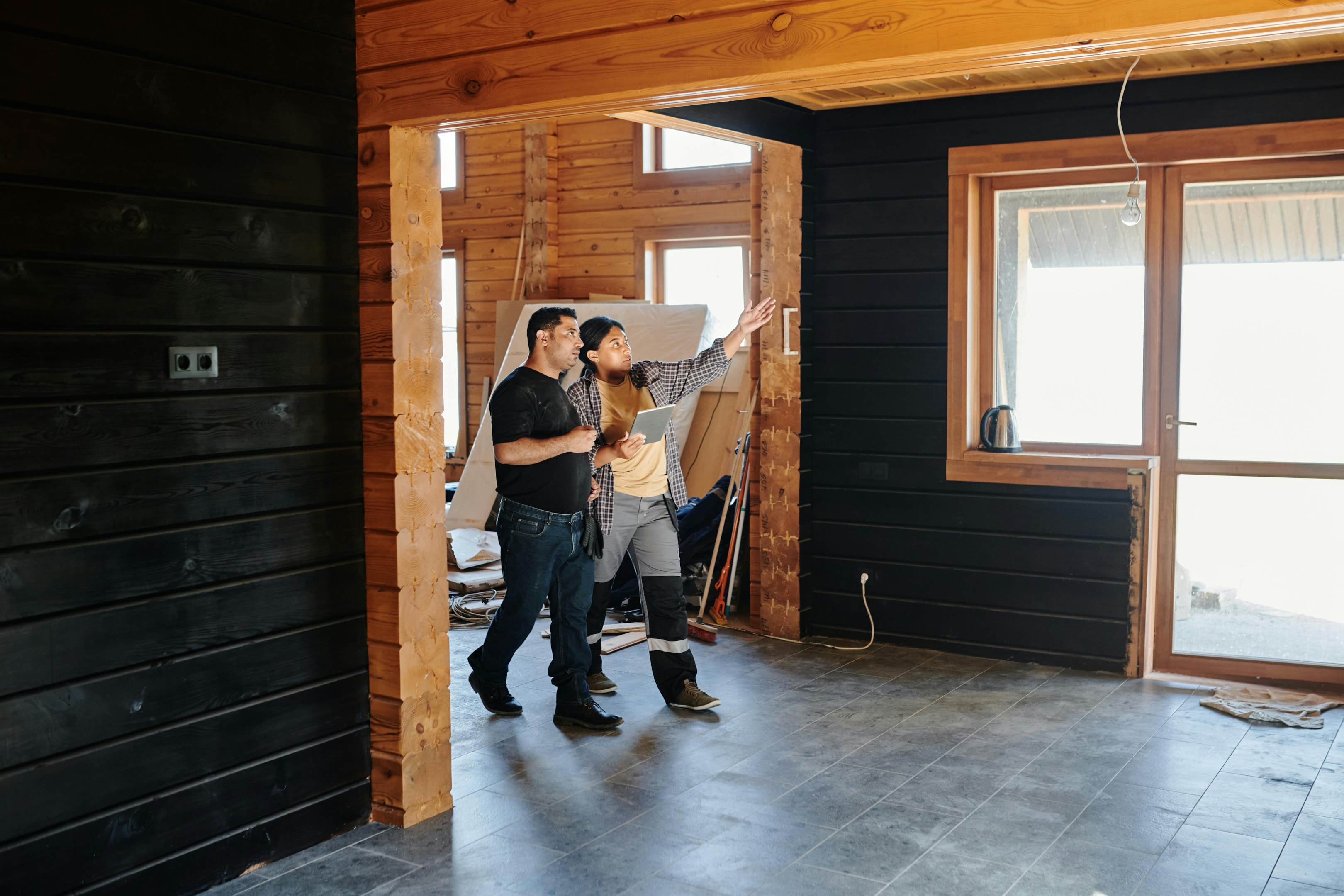Find Contractors for Real Estate: An Investor's Guide to Building a Winning Team
Introduction
Let's face it—a great contractor can make your real estate deal a success, while a bad one can ruin it. Whether flipping a house, managing a rental rehab, or working on a BRRRR deal, your success depends on the team behind the scenes, especially your contractor.
Finding reliable, skilled, and honest contractors isn't easy. Your goal is to build a team that shows up on time, stays on budget, and delivers quality work. This guide will help you find and vet contractors to build a dream team that works with you, not against you.

Why Finding the Right Contractor Is Crucial
It Impacts Everything: Cost, Time, and Quality
A bad contractor can cause major setbacks by blowing up your project timeline, leading to costly delays that disrupt your plans and increase holding costs. They might overcharge you mid-project with inflated prices, unexpected labor costs, and unanticipated material expenses that strain your budget and reduce your profit margins. Poor-quality workmanship from a bad contractor can also severely damage the resale value of your property and create long-term maintenance issues, resulting in even higher expenses down the road.
On the other hand, a great contractor will stay on schedule, ensuring that each phase of the project progresses smoothly and meets agreed deadlines. They will stick to the budget by carefully controlling costs and efficiently managing both labor and materials, preventing unnecessary overruns. Moreover, a reliable contractor makes your life easier by communicating clearly, addressing issues promptly, and delivering high-quality work that enhances the property's value and appeal. Choosing the right contractor is essential for protecting your investment and achieving a successful real estate project.
Types of Contractors Real Estate Investors Use
Real estate investors use a variety of contractor services to complete renovation and remodeling projects efficiently and to high standards.
General Contractors (GCs): Manage the entire project, coordinate contractor services, handle subs, permits, and timelines.
Subcontractors: Handle specific tasks and services within a project, such as plumbing, HVAC, roofing, or tile.
Handymen: Great for small jobs and rental maintenance, providing basic contractor services.
Specialty Trades: For specific tasks and services like foundation work, mold remediation, or solar installation.
You don't always need a GC, especially for smaller jobs. But for big flips or full gut rehabs? It's usually worth it since they are able to provide fuller coverage for a large projects versus hiring subcontractors.
Where to Find Good Contractors
Referrals from Other Investors
Your local real estate network is the best starting point for finding contractors for real estate projects. Begin by asking at real estate meetups, Facebook investor groups, and mastermind sessions, where experienced investors often share their trusted contacts. Don't overlook friends who have experience with contractors, as personal recommendations can be invaluable. Additionally, real estate agents can be a great resource for referrals to reputable contractors who have proven themselves in your local area. For tips on building your network, therefore making more valuable connections with contractors, see Mastering Real Estate Networking: Successful Strategies for Success.
Online Platforms
Platforms like Thumbtack, HomeAdvisor, Angi, Porch, Nextdoor, and Angie's List are valuable resources for finding contractors for real estate projects. By signing up for these platforms, you can access reviews, recommendations, and community insights that help you evaluate and connect with reputable contractors in your local area.

What to Ask Before Hiring a Contractor
Here are the essentials to ask when interviewing potential contractors:
Are you licensed and insured?
Can you show me recent projects?
Do you work with other real estate investors?
What is your typical work schedule for projects like this?
How do you structure payments, and what down payment is required?
Do you provide a written estimate and contract?
Red Flags to Watch For
These are key signs of a bad general contractor that you should watch out for: no written estimate provided before work begins, requests for full payment upfront without any progress, no proof of contractor's insurance, and vague or constantly shifting timelines. Recognizing these warning signs early can help you avoid hiring a bad general contractor, which in turn prevents costly mistakes, project delays, and potential legal or financial headaches down the line. Always insist on clear communication, proper documentation, and transparency to protect your investment and ensure your project stays on track.
How to Vet and Screen Contractors
Check Licensing: Verify the contractor's license status by looking it up with your state's contractor board to ensure they are legally authorized to perform the work.
Consult the City's Local Building Department: Reach out to the city's local building department to confirm the contractor's credentials and to gather information about any required building permits related to your project.
Ensure Necessary Permits: Double-check that the contractor will obtain all necessary permits before starting any work, which helps guarantee compliance with local building codes and regulations.
Ask for References: Request contact information for at least 2–3 past clients so you can call them and learn about their experience working with the contractor.
Review Photos of Previous Work: Examine photos or portfolios of the contractor's completed projects to make sure their workmanship meets your quality standards and style preferences.
Google Their Business Name + "Scam" or "Complaint": Conduct an online search combining the contractor's business name with terms like "scam" or "complaint" to uncover any negative reports or issues others have encountered.
Creating a Clear Scope of Work (SOW)
If there's one thing that kills contractor relationships, it's miscommunication. A scope of work solves that by ensuring every detail is clearly included and nothing is left ambiguous. Detailed SOWs also make it easier to compare bids from different contractors, as you can see exactly what each bid covers and verify that all costs are accounted for.
What to Include in an SOW
Every task, broken down by room or system
Materials included (paint color, tile brand, faucet model)
Who's responsible for what (permits, cleanup, disposal)
Timeline and deadlines

Structuring Payment Terms Wisely
Avoid "pay half up front" unless you're working with someone you deeply trust. Instead, agree on the price for each phase of the project and ensure the contractor is only paid after reaching the agreed milestones. This approach helps protect your investment by tying payments directly to completed work, reducing the risk of paying for unfinished or subpar work. It also encourages contractors to stay motivated and on schedule, knowing that their compensation depends on meeting specific project goals. Clear milestone payments create transparency and accountability, making it easier to manage your budget and avoid cash flow issues during the renovation or construction process.
How to Keep Contractors on Schedule
Use project management tools like Trello, Buildertrend, or Google Sheets to stay organized, conduct weekly walkthroughs or virtual updates to monitor progress, and incentivize performance by offering small bonuses for early completion or penalties for delays. Expect contractors to communicate regularly, provide timely updates, and meet all agreed-upon deadlines to ensure the project stays on track.
Using Contracts to Protect Your Investment
Always, always sign a written contract before starting any work with a contractor. It's essential to carefully determine and agree upon the contract terms upfront to avoid misunderstandings and disputes later on. Key elements to include in the contract are a detailed scope of work outlining every task and responsibility, a clear payment schedule specifying when and how payments will be made, and an expected timeline that sets deadlines for project milestones and completion. Additionally, include penalty clauses to address delays or subpar work, and warranty details that guarantee the quality and durability of the work performed. Documenting everything in writing protects both parties, as verbal agreements often lead to confusion and disagreements. Having a comprehensive, signed contract ensures accountability, sets clear expectations, and provides legal protection throughout the project.
Working with Contractors Virtually (Out-of-State Projects)
Managing out-of-state houses and properties virtually? No problem if you systemize it.
Virtual Management Tips
Require progress photos or videos daily/weekly
Use Dropbox or Google Drive to store and track files
Consider hiring a local project manager or boots-on-the-ground partner to do frequent check-ins

Building Long-Term Contractor Relationships
Contractors are not just vendors—they're business partners. Building relationships with reputable contractors is essential for ensuring quality work and successful projects.
Here's how to keep the good ones:
Pay on time
Treat them with respect
Give consistent work
Offer referrals
Tip or bonus for jobs well done
You'd be surprised how rare that is—and how much loyalty it builds. Having a positive working relationship with contractors can benefit both parties in the long run.
Common Mistakes Investors Make When Hiring Contractors
These mistakes can jeopardize your investment property:
Going with the lowest bid (usually means cutting corners)
Not getting everything in writing
Not pulling permits (can lead to fines or failed inspections)
Paying too much up front
Failing to visit the job site
Avoid these, and you're already ahead of most rookie investors. Successful investors have determined the best contractors by thoroughly vetting their experience, reviews, and track record with investment properties.
Tools and Apps to Manage Contractors
Buildertrend – full contractor/project management suite and a valuable online resource for managing contractors using industry-standard tools
CoConstruct – ideal for custom builds or flips, and serves as an online resource for industry professionals
Trello – great for visual task boards and widely used across the industry
Google Sheets + Folders – low-tech but powerful when shared with your team as an online resource for tracking every aspect of your projects
For additional industry data and best practices, consult national association websites such as the National Association of Home Builders.

Conclusion
Finding reliable contractors isn't just about completing a project—it's about protecting your investment. When you find the right people and build a system around them, your flips get smoother, your rentals get renovated faster, and your headaches shrink dramatically. Real estate investing isn't a solo sport; your team determines your trajectory, and your contractor is your MVP. So take the time to find the right fit and treat them like the gold they are. For tips on finding other professionals to have your investment business operating smoothly, see Building Real Estate Investment Team: The Ultimate Guide for Serious Investors.